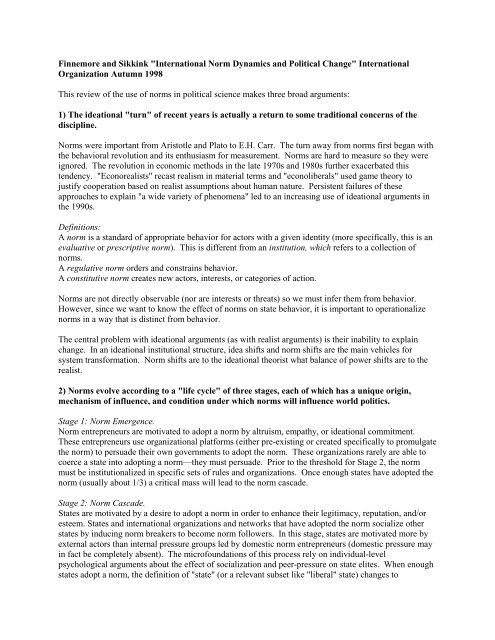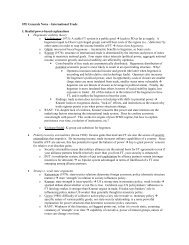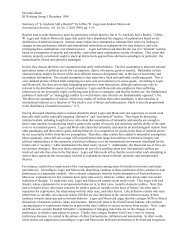International Norm Dynamics and Political Change - Olivia Lau
International Norm Dynamics and Political Change - Olivia Lau
International Norm Dynamics and Political Change - Olivia Lau
You also want an ePaper? Increase the reach of your titles
YUMPU automatically turns print PDFs into web optimized ePapers that Google loves.
Finnemore <strong>and</strong> Sikkink "<strong>International</strong> <strong>Norm</strong> <strong>Dynamics</strong> <strong>and</strong> <strong>Political</strong> <strong>Change</strong>" <strong>International</strong><br />
Organization Autumn 1998<br />
This review of the use of norms in political science makes three broad arguments:<br />
1) The ideational "turn" of recent years is actually a return to some traditional concerns of the<br />
discipline.<br />
<strong>Norm</strong>s were important from Aristotle <strong>and</strong> Plato to E.H. Carr. The turn away from norms first began with<br />
the behavioral revolution <strong>and</strong> its enthusiasm for measurement. <strong>Norm</strong>s are hard to measure so they were<br />
ignored. The revolution in economic methods in the late 1970s <strong>and</strong> 1980s further exacerbated this<br />
tendency. "Econorealists" recast realism in material terms <strong>and</strong> "econoliberals" used game theory to<br />
justify cooperation based on realist assumptions about human nature. Persistent failures of these<br />
approaches to explain "a wide variety of phenomena" led to an increasing use of ideational arguments in<br />
the 1990s.<br />
Definitions:<br />
A norm is a st<strong>and</strong>ard of appropriate behavior for actors with a given identity (more specifically, this is an<br />
evaluative or prescriptive norm). This is different from an institution, which refers to a collection of<br />
norms.<br />
A regulative norm orders <strong>and</strong> constrains behavior.<br />
A constitutive norm creates new actors, interests, or categories of action.<br />
<strong>Norm</strong>s are not directly observable (nor are interests or threats) so we must infer them from behavior.<br />
However, since we want to know the effect of norms on state behavior, it is important to operationalize<br />
norms in a way that is distinct from behavior.<br />
The central problem with ideational arguments (as with realist arguments) is their inability to explain<br />
change. In an ideational institutional structure, idea shifts <strong>and</strong> norm shifts are the main vehicles for<br />
system transformation. <strong>Norm</strong> shifts are to the ideational theorist what balance of power shifts are to the<br />
realist.<br />
2) <strong>Norm</strong>s evolve according to a "life cycle" of three stages, each of which has a unique origin,<br />
mechanism of influence, <strong>and</strong> condition under which norms will influence world politics.<br />
Stage 1: <strong>Norm</strong> Emergence.<br />
<strong>Norm</strong> entrepreneurs are motivated to adopt a norm by altruism, empathy, or ideational commitment.<br />
These entrepreneurs use organizational platforms (either pre-existing or created specifically to promulgate<br />
the norm) to persuade their own governments to adopt the norm. These organizations rarely are able to<br />
coerce a state into adopting a norm—they must persuade. Prior to the threshold for Stage 2, the norm<br />
must be institutionalized in specific sets of rules <strong>and</strong> organizations. Once enough states have adopted the<br />
norm (usually about 1/3) a critical mass will lead to the norm cascade.<br />
Stage 2: <strong>Norm</strong> Cascade.<br />
States are motivated by a desire to adopt a norm in order to enhance their legitimacy, reputation, <strong>and</strong>/or<br />
esteem. States <strong>and</strong> international organizations <strong>and</strong> networks that have adopted the norm socialize other<br />
states by inducing norm breakers to become norm followers. In this stage, states are motivated more by<br />
external actors than internal pressure groups led by domestic norm entrepreneurs (domestic pressure may<br />
in fact be completely absent). The microfoundations of this process rely on individual-level<br />
psychological arguments about the effect of socialization <strong>and</strong> peer-pressure on state elites. When enough<br />
states adopt a norm, the definition of "state" (or a relevant subset like "liberal" state) changes to
incorporate it. This creates cognitive dissonance between behavior <strong>and</strong> identity in non-conforming states.<br />
To retain one’s identity, then, one must adopt the norm.<br />
Stage 3: Internalization.<br />
Domestic <strong>and</strong> international laws, professional training, <strong>and</strong> bureaucratic operating procedures widely<br />
incorporate the norm. Any remaining non-conforming states adopt it simply to conform. The norm is so<br />
institutionalized that it becomes a matter of habit <strong>and</strong> is taken for granted.<br />
Stage 1<br />
Stage 2<br />
<strong>Norm</strong> Emergence<br />
<strong>Norm</strong> Cascade<br />
Actors <strong>Norm</strong> entrepreneurs with States, international<br />
organizational platforms organizations, networks<br />
Motives Altruism, empathy, Legitimacy, reputation,<br />
ideational commitment esteem<br />
Dominant Persuasion Socialization,<br />
Mechanisms<br />
institutionalization,<br />
demonstration<br />
What kind of norms will matter under what conditions?<br />
Stage 3<br />
Internalization<br />
Law, professions,<br />
bureaucracy<br />
Conformity<br />
Habit,<br />
institutionalization<br />
Legitimation—states suffering from legitimacy crises may be especially inclined to adopt international<br />
norms.<br />
Prominence—norms held by states widely viewed as successful are more likely to be adopted.<br />
Intrinsic qualities—universalism, individualism, voluntaristic authority, rational progress, <strong>and</strong> world<br />
citizenship may by objective characteristics of norms that are more likely to be adopted. (Others include<br />
norms involving bodily harm to innocent groups or legal equality of opportunity).<br />
Adjacency claims or path dependence—new norms that "fit" in existing frameworks of norms may be<br />
more successful.<br />
World time context—international crises may spark an ab<strong>and</strong>onment of norms perceived to lead to the<br />
crisis <strong>and</strong> an intensive search for new norms. Recent gains in technology that lower organizational costs<br />
may also increase the number of new norms that are adopted.<br />
3) The tendency to oppose norms to rationality is not helpful in explaining the most salient political<br />
processes. Instead we must recognize that "Rationality cannot be separated from any politically<br />
significant episode of normative influence or normative change, just as the normative context<br />
conditions any episode of rational choice."<br />
Four cleavages are identified <strong>and</strong> their worth refuted:<br />
Materialism—Rational choice theorists argue that the claim that norms cause behavior does not tell us<br />
much, so we should rely on better-specified materialist explanations. BUT rational choice explanations<br />
can specify ideational concerns in their utility functions.<br />
Utilitarianism—Rational choice arguments are agent-based (people try to get what they want) while<br />
ideational arguments are structure-based (people behave according to the "logic of appropriateness" by<br />
conforming to roles <strong>and</strong> rules). BUT the debate between these groups has revolved around whether the<br />
"logic of appropriateness" even exists, rather than which logic applies to what kind of actors when (which<br />
would be much more fruitful).<br />
Choice—Ideational theorists criticize rational choice theorists for believing individual choice exists when<br />
ideational models focus on how internalized norms eliminate that choice. This sets up the classic free
will-determinism dispute. BUT ideational theories as they have been applied to IR are not very<br />
deterministic because they emphasize the contingent <strong>and</strong> contested nature of normative change.<br />
Persuasion—Ideational theorists focus on persuasion, which can be thought of as the attempt to change<br />
others' preferences, but rational choice theory cannot endogenize these preference changes. BUT<br />
persuasion is central to politics <strong>and</strong> therefore must be explained.




